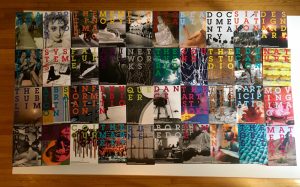Gabriel Levine and I are in the process of editing a new volume in the excellent MIT/Whitechapel Documents of Contemporary Art book series on the topic of Practice. The book should be out in early 2018. The book collects writings about practice by philosophers, artists and other kinds of practitioners. There will likely be about 80 selections in the book, including texts by Karl Marx, Paul B. Preciado, the Dalai Lama, Lygia Clark, Group Material and many more.
To quote from an introduction written by Gabe and I: “In the early twenty-first century, no single word crops up in so many contexts – from art to science to theory to politics to everyday life – as “practice.” A central term in the social sciences, from science studies to sociology to media studies, “practice” is often taken for granted and only occasionally explicitly theorized. Artists and non-artists write statements describing “my practice,” while art critics speak of “social practice” or “contemporary practice.” In politics, practice a.k.a. “praxis” is in crisis – caught between old forms of mass struggle and new social movements anchored in the collective practice of daily life. And all of this is occurring on a global scale. Yet in all of these contexts, the layers and histories of “practice” are rarely addressed. What do people talk about when they talk about practice? Is everything a practice – and what are we (diverse humans and nonhumans around the planet) practicing for?
Once used philosophically to designate “doing,” (praxis) in a triad with “thinking” (theoria) and “making,” (poiesis) practice has soaked up other connotations: from political action (revolutionary praxis), to professional activity (the practice of law or medicine), to discipline, rehearsal or training (zen practice, basketball practice). The discourse of practice in contemporary art tends to blend all of these meanings, with “practice” also standing in for the shift away from the artwork or medium, and toward open-ended actions, series, processes and projects. While the turn to “practice” might promise a freedom from finality or eventfulness, it also reflects the neoliberal pressures to train oneself, to perform, and to rehearse a marketable set of skills. On this “planet of the practicing,” as the philosopher Peter Sloterdijk calls it, there are winners and losers, and perhaps those who fail should just have practiced a little harder. Indeed, practice and “praxeology” were central to the work of Austrian school economist Ludwig von Mises, who clearly saw the discipline of economics as a whole as the study of modes of organizing “purposeful action” (Human Action).”
My own work has been focused on the problem of practice for many years. In the 2000s I explored the idea of “sadhana”, the Sanskrit word for practice, and the relation of Asian religions to contemporary literature. I tried to show the varied attempts to reformulate an idea of practice by writers from Europe and America encountering Buddhism and yoga, and how their worldviews were destabilized by a new thought of practice. This work formed the basis of my contribution to Nothing: Three Inquiries in Buddhism (U. Chicago, 2015) as well as various essays on Buddhist topics. It also informed my attempt to develop a Buddhist theory of intellectual property in In Praise of Copying (Harvard, 2010), and my contribution to the shift in studies of IP from legal debates to the study of “practices of copying”. My more recent work on “sound and popular discipline” uses the latter term as a synonym for practice – or praxis, in the sense of collective action. In The Politics of Vibration and other essays and talks, I argue for a rethinking of sound studies that take into account popular practices of sonic production and consumption. The Book of Methods, the co-edited collection of William S. Burroughs and Brion Gysin’s unpublished writings on the cut up and other radical aesthetic practices, that I’m working on with Davis Schneiderman is also a kind of experimental manual of practices. I might even claim that my work on drugs and literature, notably in The Road of Excess: A History of Writers on Drugs, addressed the problem of what it might mean to speak of a literary practice, notably insofar as literary drug use has involved formal protocols of experimentation, as in the work of Benjamin, Burroughs and more recently, Preciado.

Speak Your Mind